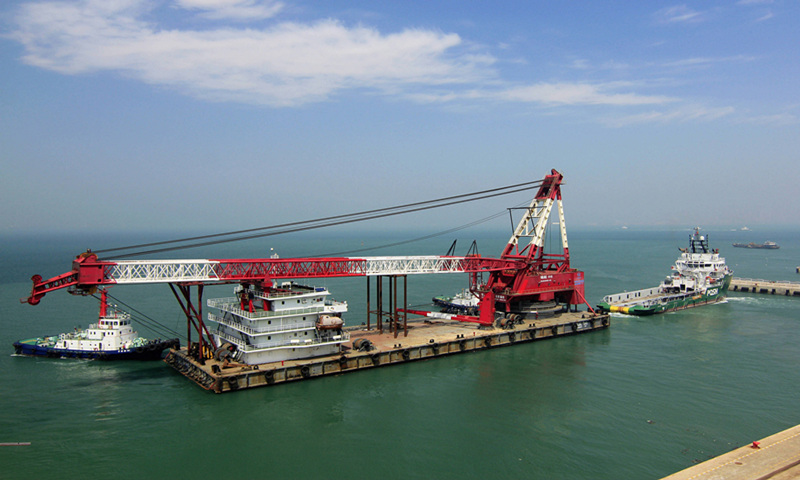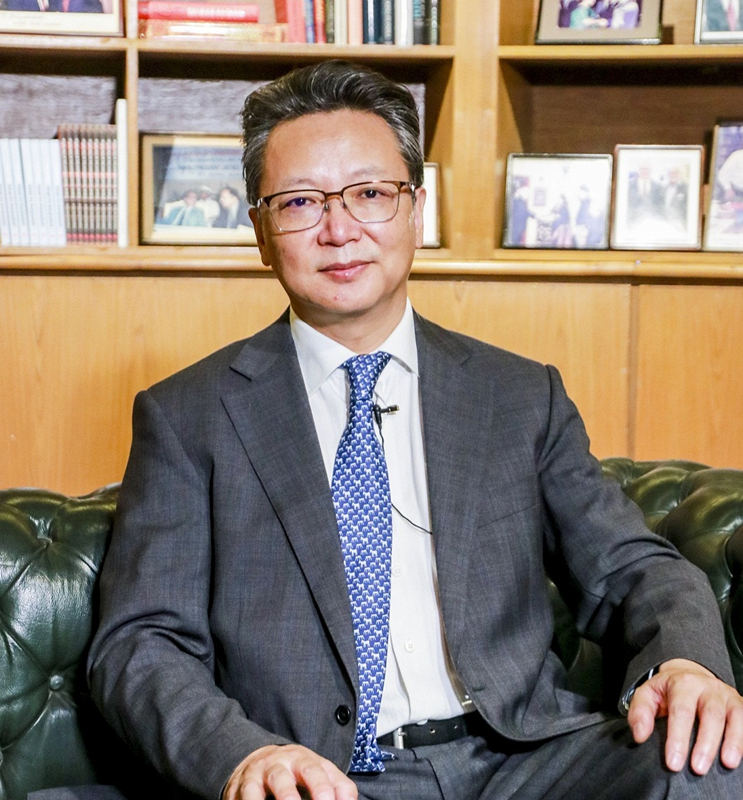When it comes to economic and technological cooperation, China and Bangladesh have infinite potential
By Dong Feng Source: Global Times Published: 2020/10/26 18:50:24

Construction equipment for the Padma Bridge in Munshiganj on the outskirts of Dhaka, Bangladesh, is transported from Qingdao, East China's Shandong Province on April 15, 2015. Photo: VCG
Recent years have witnessed China-Bangladesh bilateral cooperation deepening, and China's Ambassador to Bangladesh believes the outlook for further cooperation is a promising one.
The economic and trade cooperation between China and Bangladesh has continued to deepen. Chinese companies have implemented several major infrastructure projects in Bangladesh's transportation, energy and electricity, telecommunications and other fields, making positive contributions to the economic and social development of the two countries, China's Ambassador to Bangladesh Li Jiming told the Global Times on Friday.

Chinese Ambassador to Bangladesh Li Jiming Photo: Courtesy of Chinese Embassy in Bangladesh
China and Bangladesh have a tradition of being friendly neighbors. Over the past 45 years since the establishment of diplomatic relations, high-level exchanges between the two countries have maintained a good momentum, practical cooperation in the fields of economy, trade and investment has been continuously deepened, and the number of cultural exchanges has increased. The economies of China and Bangladesh are highly complementary and have great potential for cooperation.
In particular, railway projects have become the largest area of bilateral cooperation. The largest-scale project in Bangladesh supported by the Chinese government's preferential loan, the Padma Bridge Rail Link project with a cost of $3.14 billion, is a part of Belt and Road Initiative and an important element in the creation of the "Bangladesh-China-India-Myanmar (BCIM)" economic corridor. It is constructed by the China Railway Group Limited (CREC).
The project is 169 kilometers long and spans six regions in Bangladesh. First going into service on July 3, 2018, it has since created more than 5,000 direct jobs and tens of thousands of indirect jobs for local residents as well as bringing subcontracting business to more than 100 local companies. It is also the project that has provided the most local jobs during the epidemic this year, playing a strong supporting role for Bangladesh's economic recovery, Li said.
From the perspective of development strategy, the Bangladeshi government is committed to the construction of large-scale infrastructure projects to accelerate economic growth, and to join the ranks of middle-income countries by 2021 and the ranks of developed countries in 2041 - ultimately realizing the golden Bangladeshi dream, or Sonar Bangla.
In addition, China has undertaken several other large-scale projects in Bangladesh, including the Padma Bridge, the Bangabandhu International Conference Center, Payra 2×660 MW Coal-fired Power Plant, and the IV Tier National Data Center, all of which are in line with Bangladesh's development plan, and are making important contributions in developing Bangladesh's economy, its society, and peoples' livelihoods.
Meanwhile, even though the coronavirus continues to spread in Bangladesh, the Multi-lane Road Tunnel Project under the Karnaphuli Riverhas continued to advance steadily also, with the project in fact progressing ahead of schedule.
On August 2, the left-line tunnel was successfully completed, and once the project is finished - as the first underwater tunnel in Bangladesh and even South Asia - it will become both an important part of the BCIM Economic Corridor, and an important part of the BRI construction. The construction of the Karnaphuli Tunnel will not only greatly improve the traffic conditions in the port city of Chittagong, promoting the development of the regional economy in Bangladesh, but play an important role in improving the Asian highway network, promoting interconnectivity between Bangladesh and its neighboring countries, and pushing forward the international development of Bangladesh.
During the implementation of the project, [the Chinese contractor] has been able to establish good, long-term cooperative relations with local suppliers and subcontractors, inviting them to participate in local technical exchange sessions, sharing advanced management concepts and technical experience, while continuously exploring and improving the level of localized management. Such sharing has promoted technical exchanges between the two countries, improving the local employment level and stimulating local economic development, Li noted.
During tunnel excavation, the project team earnestly fulfilled its social responsibilities, vigorously promoted energy conservation and environmental protection. Meanwhile the team strictly recycled and stored waste soil and slag generated during tunnel excavation construction, using recycled resources to assist Naval Academy in filling abandoned recesses and backfilling project construction land. The development and utilization of recycled resources and local land resources were made possible.
After the successful completion of the left-line tunnel, the project attracted lots of attention from domestic and foreign media, and won recognition from the project owner, marking a major advancement in developing Chittagong City's One City and Two Towns plan. By demonstrating real results, China's advanced tunnel construction technology and excellent management capabilities have established a good brand image, he said.
Bangladesh is one of the fastest growing countries in the Asia-Pacific region, and one of the most dynamic countries in the world for economic development. It has abundant labor resources and a vast market, but its infrastructure is seriously insufficient. Whilst China has the world's most complete manufacturing supply chain, the development stages of China and Bangladesh are relatively similar.
China continues to expand its opening-up. Under the BRI, China will continue to support Bangladesh's infrastructure construction through various means, such as preferential loans, investment, project contracts and free assistance. In the future, more Chinese investors will participate in Bangladesh's economic construction, Li explained.
Based on the developmental advantages of this bilateral investment cooperation, the scope for future cooperation between China and Bangladesh is likely to be very broad. With the continuous economic and social development of Bangladesh, China and Bangladesh will have more opportunities for investment cooperation in high-tech fields such as 5G, high-speed rail, aerospace, and the Blue Economy.
China and Bangladesh could also explore how to cooperate together to address climate change, poverty reduction, medical and healthcare, and human resource development, he said.
Newspaper headline: BRI teamwork
Posted in: DIPLOMATIC CHANNEL,INSIGHT